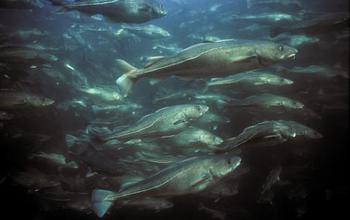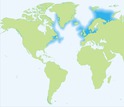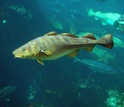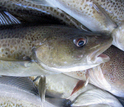Hola amigos: A VUELO DE UN QUINDE EL BLOG., Durante siglos, el bacalao eran la columna vertebral de la pesca de Nueva Inglaterra y una especie clave en el ecosistema del Golfo de Maine.
Hoy en día, las poblaciones de bacalao están al borde del colapso, flotando en el 3-4 por ciento de los niveles sostenibles. Incluso los dolorosos recortes a la pesquería no han logrado frenar este rápido descenso, sorprendiendo a los pescadores y los administradores pesqueros.
Ahora, un informe publicado esta semana en la revista Science une el colapso del bacalao directamente al rápido calentamiento de las aguas oceánicas.
"He aquí una explicación de por qué el Golfo de pesquería de bacalao de Maine no se ha recuperado a pesar de la pesca reducido significativamente", dice Mike Sieracki, director del programa en la División de Ciencias Oceánicas de la Fundación Nacional de Ciencia (NSF). "Los planes de manejo deberán incorporar factores de cambio climático para ser eficaz."
NSF financió la investigación a través de su Coastal VE (Ciencia, Ingeniería y Educación para la Sostenibilidad) Programa.
Entre 2004 y 2013, el Golfo de Maine calienta más rápido que el 99 por ciento de los océanos del mundo. El rápido calentamiento estaba vinculado a los cambios en la posición de la Corriente del Golfo y de las oscilaciones climáticas en el Atlántico y el Pacífico. Estos factores añaden al ritmo constante del calentamiento causado por el cambio climático global.
More information....
New report shows that warming complicates fisheries management plans Credit and Larger Version |
For centuries, cod were the backbone of New England's fisheries and a key species in the Gulf of Maine ecosystem.
Today, cod stocks are on the verge of collapse, hovering at 3-4 percent of sustainable levels. Even painful cuts to the fishery have failed to slow this rapid decline, surprising both fishers and fisheries managers.
Now a report published this week in the journal Science links the cod collapse directly to rapid warming of ocean waters.
"Here is an explanation for why the Gulf of Maine's cod fishery has not recovered despite significantly reduced fishing," says Mike Sieracki, program director in the Division of Ocean Sciences at the National Science Foundation (NSF). "Management plans will need to incorporate climate change factors to be effective."
NSF funded the research through its Coastal SEES (Science, Engineering and Education for Sustainability) Program.
Between 2004 and 2013, the Gulf of Maine warmed faster than 99 percent of the global ocean. The rapid warming was linked to changes in the position of the Gulf Stream and to climate oscillations in the Atlantic and the Pacific. These factors added to the steady pace of warming caused by global climate change.
Over the past decade, in the face of quickly declining cod stocks, fisheries managers placed a series of restrictions on harvesting this key Gulf of Maine species. Even strict quota limits on fishers failed to help cod rebound.
"Fishers stayed well within their limits for cod, and yet stocks continued to decline" says Andrew Pershing, chief scientific officer of the Gulf of Maine Research Institute (GMRI) and lead author of the study. "That told us something else was going on--and it turns out that warming was driving the decline."
Pershing and colleagues from GMRI, the University of Maine, Stony Brook University, the Bigelow Laboratory for Ocean Sciences, and NOAA's Earth System Research Laboratory found that increasing water temperatures reduced the number of new cod produced by spawning females.
The results also suggest that warming waters led to higher mortality of young fish.
The models used by managers to set quotas for cod did not account for the effects of rising temperatures, leading to quotas that were too high.
Fishers stayed within their quotas but still took more fish than the population could sustain.
"This creates a frustrating situation that contributes to mistrust among fishers, scientists and managers," Pershing says.
According to the report, recovery of Gulf of Maine cod depends on sound fishery management and on knowing water temperature.
Cod is a cold-water species, and the Gulf of Maine is at the edge of its geographic range. As the ocean warms, the capacity of the Gulf of Maine to support cod will decline, leading to a smaller population and a smaller fishery.
The study shows the risk of not including water temperature in fisheries models, especially for stocks like Gulf of Maine cod at the edge of their range.
The warmer climate gets, the less fisheries managers can rely on historical data, Pershing notes.
"The ability to predict the effect of warming on fish stocks will be an important part of adapting fisheries to a changing climate," he says.
The study was also funded by the Lenfest Ocean Program.
-NSF-
Media Contacts Cheryl Dybas, NSF, (703) 292-7734,
cdybas@nsf.gov
Elijah Miller, Gulf of Maine Research Institute, (207) 228-1667,
Elijah Miller, Gulf of Maine Research Institute, (207) 228-1667,
Related WebsitesNSF Grant: Coastal SEES (Track 2), Collaborative Research: Resilience and Adaptation of a Coastal Ecological-Economic System in Response to Increasing Temperature: http://www.nsf.gov/awardsearch/showAward?AWD_ID=1325484&HistoricalAwards=false
NSF News: NSF awards $15 million in second set of coastal sustainability grants: http://www.nsf.gov/news/news_summ.jsp?cntn_id=132637
NSF News: NSF awards first coastal sustainability grants for research on world's most populated areas:
http://www.nsf.gov/news/news_summ.jsp?cntn_id=129266
Gulf of Maine Research Institute:
http://www.gmri.org/
The National Science Foundation (NSF) is an independent federal agency that supports fundamental research and education across all fields of science and engineering. In fiscal year (FY) 2015, its budget is $7.3 billion. NSF funds reach all 50 states through grants to nearly 2,000 colleges, universities and other institutions. Each year, NSF receives about 48,000 competitive proposals for funding, and makes about 11,000 new funding awards. NSF also awards about $626 million in professional and service contracts yearly.
Useful NSF Web Sites:
NSF Home Page:
http://www.nsf.gov
NSF News:
http://www.nsf.gov/news/
For the News Media:
http://www.nsf.gov/news/newsroom.jsp
Science and Engineering Statistics:
http://www.nsf.gov/statistics/
Awards Searches:
http://www.nsf.gov/awardsearch/

Atlantic cod is widely distributed on both sides of the North Atlantic Ocean and beyond.
Credit and Larger Version

Bottom-dwelling fish such as Atlantic cod are often found near structures such as shipwrecks.
Credit and Larger Version

The once-healthy cod fishery off New England has been affected by ever-warmer waters.
Credit and Larger Version

A haul of codfish is ready to go to market then dinner tables.
Credit and Larger Version

An illustration of an Atlantic cod from the 1876 book "Treasures of the Deep."
Credit and Larger Version
The National Science Foundation (NSF)
Guillermo Gonzalo Sánchez Achutegui
ayabaca@gmail.com
ayabaca@hotmail.com
ayabaca@yahoo.com
Inscríbete en el Foro del blog y participa : A Vuelo De Un Quinde - El Foro!

No hay comentarios:
Publicar un comentario